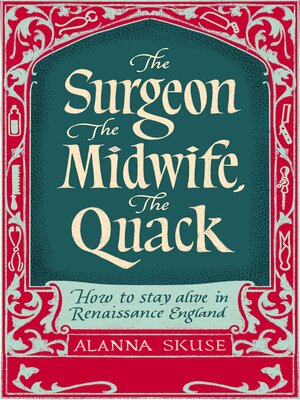The Surgeon, the Midwife, the Quack
ebook ∣ How to Stay Alive in Renaissance England
By Alanna Skuse

Sign up to save your library
With an OverDrive account, you can save your favorite libraries for at-a-glance information about availability. Find out more about OverDrive accounts.
Find this title in Libby, the library reading app by OverDrive.



Search for a digital library with this title
Title found at these libraries:
| Library Name | Distance |
|---|---|
| Loading... |
Discover the remarkable birth of modern medicine... and how not to die in the Renaissance
'Meticulously researched and deliciously detailed.' Victoria Shepherd, author of A History of Delusions
The cliched view medicine in the Renaissance world is dreadful: gore-splattered hacksaws, arsenic concoctions, the four humours and all those leeches...
Reality, however, proves somewhat different.
In the sixteenth and seventeenth centuries, a medical revolution was afoot. Physicians' education was being formalised. Surgeons were documenting the intricacies of the human body with ever-greater skill. And, as European powers expanded into the New World, novel medicines and treatments were being discovered.
Alanna Skuse ventures into the bustling medical marketplace of Renaissance England – a world of travelling surgeons, prosthetics craftsmen, faith healers and snake oil merchants.
Discover domestic healers like Elizabeth Freke, a doyenne of folk remedies, always ready to dole out tonics and elixirs to her ailing neighbours. Browse the shelves of the early modern apothecary with Nicholas Culpeper as he lays the groundwork for the modern pharmacy. Meet the expert midwife Jane Sharp, successful author and pioneer of women's health. Join the intrepid plague doctor George Thomson as he braves London's Great Plague.
Humane and entrancing, The Surgeon, The Midwife, The Quack reveals the people and stories behind a scientific revolution.
'Meticulously researched and deliciously detailed.' Victoria Shepherd, author of A History of Delusions
The cliched view medicine in the Renaissance world is dreadful: gore-splattered hacksaws, arsenic concoctions, the four humours and all those leeches...
Reality, however, proves somewhat different.
In the sixteenth and seventeenth centuries, a medical revolution was afoot. Physicians' education was being formalised. Surgeons were documenting the intricacies of the human body with ever-greater skill. And, as European powers expanded into the New World, novel medicines and treatments were being discovered.
Alanna Skuse ventures into the bustling medical marketplace of Renaissance England – a world of travelling surgeons, prosthetics craftsmen, faith healers and snake oil merchants.
Humane and entrancing, The Surgeon, The Midwife, The Quack reveals the people and stories behind a scientific revolution.







